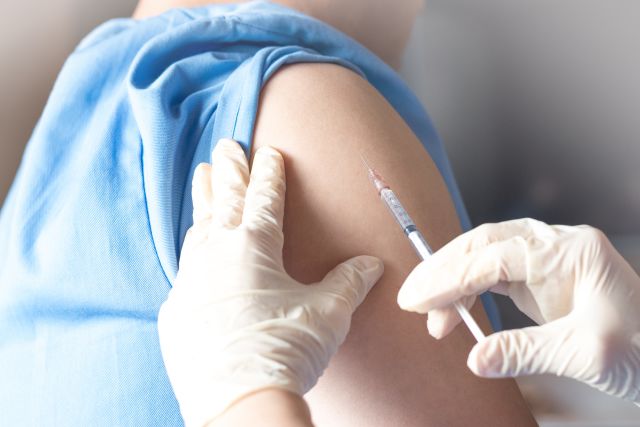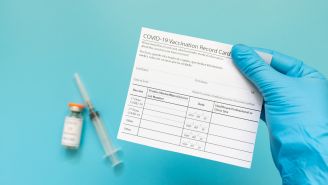Updated on January 11, 2022.
Most people receive two doses of the Pfizer or Moderna vaccine to be considered fully vaccinated but some people with weakened immune systems should receive four shots, according to the U.S. Centers for Disease Control and Prevention (CDC).
People ages 5 and older who are moderately or severely immunocompromised should get an additional “third” shot as part of their primary series, U.S. health officials advise. So, kids ages 5 to 17-years old who received two doses of the Pfizer vaccine should get a third shot 28 days after their second dose. Adults who received two doses of either the Pfizer or Moderna vaccine should also get a third shot 28 days after their second jab.
Everyone 12 years and older, including immunocompromised people, should also get a COVID booster. The Pfizer or Moderna boosters may be given five months after completing the primary vaccine series.
So, immunocompromised kids age 12 to 17 who received a third primary dose should get a Pfizer booster five months later. Similarly, immunocompromised adults who got either the Pfizer or Moderna vaccine can get a booster five months after their third shot.
Keep in mind the following exceptions: Kids ages 5 to 11-years old are not yet eligible for a COVID booster—even if they are immunocompromised or at high-risk for severe disease.
The CDC also advises that immunocompromised adults who received the Johnson & Johnson (J&J) vaccine do not need an additional, or third, primary dose at this time. But those who received the single-dose J&J vaccine can get a booster two months after their shot.
People are able to “mix & match” or choose which booster they would like to receive but the CDC says the Pfizer or Moderna boosters are preferred in most situations.
Why some immunocompromised people need four shots
In August, federal officials at the U.S. Food and Drug Administration (FDA) and CDC agreed that an additional, third primary shot of the Pfizer or Moderna mRNA vaccines is important for certain people with weakened immune systems.
Mounting evidence suggests that some immunocompromised people fail to develop a strong initial immune response. Health officials argue that a third primary dose—plus a fourth booster dose—is not only safe but could also better protect them over time.
Having a weakened immune system puts people at greater risk for severe COVID-19 and death from the infection. But for people with weakened immune systems, the existing COVID-19 vaccines, which are highly effective for healthy adults, may not have the same efficacy rate. So even if they are fully vaccinated, they’re not as protected from the coronavirus.
It’s estimated that about 2.7 percent of U.S. adults are living with weakened immune systems, according to the CDC. Roughly 2.6 percent of children are also immunocompromised. And some 15 million people in these groups won’t develop a strong immune response after being vaccinated against COVID-19, according to Johns Hopkins Medicine.
What recent data shows
Studies have repeatedly shown that immunocompromised people can develop stronger immune responses after receiving additional shots.
Researchers recruited 120 transplant recipients who had received two doses of the Moderna vaccine. The people involved in the study, who ranged from 63 to 71-years old, had never been diagnosed with COVID-19. They were randomly assigned to receive either a booster or a placebo shot two months after receiving their second dose of the vaccine.
The August 2021 study published in The New England Journal of Medicine found that a third dose of the vaccine dramatically raised protective antibody levels against the coronavirus in the transplant recipients. One month after the third shot, 55 percent of those who got the vaccine developed antibody levels likely to provide significant protection. Meanwhile, the same was true for only 18 percent of those who received the placebo shot.
Other important findings: Counts of protective T-cells—which kick into action and stimulate the production of antibodies and other immune cells that help clear infections—were also higher among the people who received the third dose of the vaccine. The study also showed that receiving another dose of the vaccine did not cause organ rejection among any of the participants. Overall, side effects among those who got the third dose were only slightly more common than the placebo group.
Another June 2021 study by Johns Hopkins published in Annals of Internal Medicine suggests that three doses of the COVID-19 vaccine increase antibody levels among transplant patients. The study included 30 organ transplant recipients who received a third dose of the Johnson & Johnson/Jansen Moderna or Pfizer/BioNTech vaccine. Researchers found that one-third of the participants who had negative antibody levels and all of those who had low positive levels before the booster dose increased their immune response after getting a third shot.
Why calls for vaccinations and boosters have intensified
Omicron remains the dominant strain in the United States, accounting for nearly all new cases, but early data suggest that boosters help improve protection against this highly contagious variant.
Scientists are working quickly to determine how much more easily Omicron spreads compared to previous variants, whether it causes more severe or milder disease, and whether it’s less susceptible to existing COVID vaccines and antiviral treatments. But its worrisome mutations and evidence that it out-competes the Delta variant prompted the CDC to issue a stronger recommendation, urging all those eligible to get fully vaccinated and boosted.






